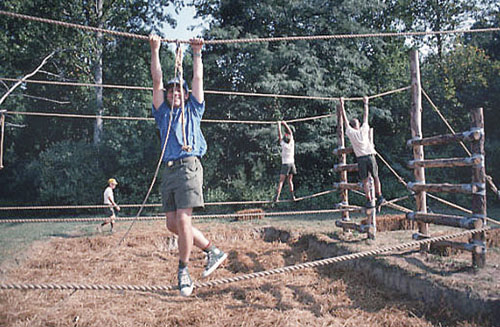State DEC withdraws support for Boy Scouts’ course

The state Department of Environmental Conservation has withdrawn its support for a controversial COPE obstacle course proposed for a wooded area of the Baiting Hollow Boy Scout Camp, potentially limiting the project’s chances of gaining approval from the Riverhead Town Planning Board.
“DEC determined the plan for the camp did not meet the [1981] conservation easement’s requirement that no further development could occur on the land,” said DEC spokesperson Aphrodite Montalvo. “As the conservation easement states, ‘No buildings, residences, mobile homes or other structures … shall be constructed … on the Protected Property …”
A COPE (Challenging Outdoor Personal Experience) course is a series of rope- and wire-climbing obstacles that exist at Boy Scouts camps throughout the country. But the proposed location of the Baiting Hollow course is about 100 feet from the backyards of some neighbors on Silver Beech Lane, who have rallied to oppose the plans.
Baiting Hollow camp director Jim Grimaldi described the proposed course as requiring the installation of a dozen 35-foot telephone poles on camp property east of Fresh Pond. A variety of climbing exercises will be hung from wires between the poles, including a zip line, a cargo net, a Burma bridge, a balance beam and other climbing apparatus.
The Scouts have said the proposed location is the only place the course can be built on the 90-acre Baiting Hollow property because the rest of the land is too hilly.
The DEC’s withdrawal of its support came after some Baiting Hollow residents who live near the proposed course met Saturday with the DEC official who ruled last year that a COPE course was “in keeping with the spirit and intent of the conservation easement” the DEC applied to the property in 1981 after paying the Suffolk Boy Scouts $127,000.
That land remains under the ownership of the Suffolk Boy Scouts, but the easement puts restrictions on what can be built on it in order to preserve the land.
Heather Amster, the DEC’s regional real property supervisor, who wrote a letter of support for the COPE course on May 11, 2012, met with residents Saturday at the home of Bob and Mary Oleksiak, who live closest to the proposed COPE course. The Oleksiaks’ attorney, former Riverhead Town supervisor Phil Cardinale, was also present.
Ms. Amster’s 2012 letter, written to Mr. Grimaldi, read that “Natural Resources staff have reviewed the design plans and purpose of the rope course and have determined there will be little to no impact to the protected property, and that the course itself is in keeping with the spirit and intent of the conservation easement.”
Mr. Cardinale wrote to DEC regional director Peter Scully on May 10, emphasizing that “the public paid a considerable sum for this conservation easement. The public has a right to expect the conservation easement they paid for will be enforced. If the State of New York, via the DEC, elects to waive any of the conservation protections the public paid for, that waiver must, as required by law, be made publicly and placed on the public record of the Suffolk County Clerk’s office.”
The easement’s stated intent is to “preserve perpetually the protected property in its natural, scenic, open space and wooded condition,” Mr. Cardinale stressed in his letter, saying this intent “would be violated” by the construction of the COPE course.
Mr. Cardinale said he made these same points in the meeting Saturday.
On Monday, Ms. Amster sent a new letter to Dirk Smith, the Scout Executive of the Suffolk County Boy Scouts, and copied Riverhead Town.
“The department finds it necessary to withdraw its approval for the placement of a COPE course on lands under conservation easement to the [DEC] at the Baiting Hollow Boy Scout Camp,” her letter reads.
Ms. Amster wrote that the “new information” received by DEC officials “demonstrates that the project’s purpose and scope are more significant than previously indicated. Of particular concern are the scenic impacts the project would have and the potential utilization of the course by non-scouting organizations for a fee, neither of which is consistent with the conservation easement.”
Mr. Grimaldi said on Tuesday that he had not read Ms. Amster’s letter and could not comment.
John Roe, the Scouts’ attorney, could not immediately be reached for comment.
Mr. Cardinale said he believes the COPE course cannot be built without the DEC’s approval.
Bill Duffy, the attorney for the town Planning Board, which has held two public hearings on the application, said the town has received the DEC’s letter and town officials are discussing whether the course could be permitted without its support.
The Planning Board has yet to issue a decision on the COPE course, and has another meeting scheduled for today, Thursday, May 16, at 3 p.m.
“We had just found out about the covenants last week and we’re happy that DEC was nice enough to come out and visit with us,” Mr. Oleksiak said. “We’re very happy to find out we did have some say in the matter.”








